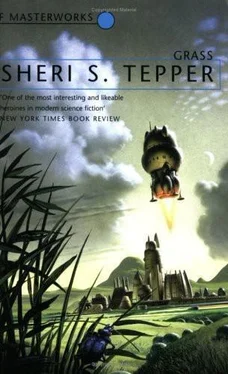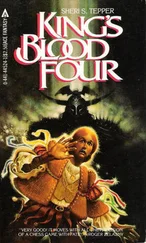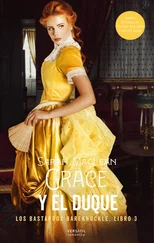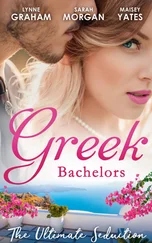And then, too, she did love Rigo, When she had said that to Marjorie, it hadn’t been a lie. Of all the men she had loved, she probably loved Rigo most. He had been most fun.
But Rigo was hardly fun at all in this place. When love wasn’t fun, it was just boring and dull and achy. People had to have things that were fun for them. What Marjorie had said about pets was probably the best advice anyone was going to give her, even though it had come from Rigo’s wife.
Eugenie begged a ride from Roald Few to Commoner Town, enjoying the trip because of all the sweet things he and the other men said to her. It was Roald himself who told her to look up Jandra Jellico. “If you’re looking for something little and petful and fun to have, Jandra may have it or she’ll know who has. She’s got most everything in fur and feathers and pretty skin, Jandra does.” He warned her, too, that Jandra would be in a half-person, as though Eugenie was the kind of person to make unkind remarks or stare.
And Jandra, after Eugenie had been with her for half an hour, knew everything about her just as Roald had. Knew and appreciated and felt a bit sorry for, while at the same time blessing her guardian spirits that Eugenie had come along just now to solve her dilemma. “I’ve got just the thing for you,” she said. “Something I got from Ducky Johns, down in Portside. Wasn’t right Ducky should keep it down there among the sensees and the profligates, so I had her bring it here to me. I keep it in the spare bedroom.”
She brought it out, the slender prettiness of it, the long-haired sweetness of it, the sidling, goose-eyed gaze of it, all done up in girl skin and girl smell and dressed in a pretty smock which it had learned to keep down. “I call her the Goosegirl,” said Jandra, not saying why. Eugenie wasn’t an awl-eyed one like Jandra’s own dear Jelly, to see what others hadn’t noticed, that almost mindless, birdish stare turned on each and every one as though to ask the world what there was to be afraid of out there, knowing already in its little bird mind that there was something.
“It’s a girl,” said Eugenie, uncomplaining, but definite. “Not an animal.”
“Well there’s one opinion and another about that,” said Jandra, squeezing the end of her nose between her fingers as she did sometimes while puzzling out the ethics of a situation. “It doesn’t know its name. It can’t dress itself. It is potty trained, for which I’m more than grateful, so there’s one small thing making it better than a puppy, which I haven’t one of nor nobody else I know, so no matter. It’ll sit brushing at its hair for the better part of a day, and it has a good appetite for most anything you’d eat yourself and I’ve halfway taught it to eat with a spoon. Sometimes it makes a noise as if it was about to say something. Not often, mind you, and it surprises itself when it does.”
“You should say ‘she,’” corrected Eugenie. The pretty thing was as female as she herself was, and very much of her own size.
“Well, there’s one opinion and another about that, too. Still, I’d be inclined to agree with you, and I call her ‘she’ to myself, don’t you know. It’s a playful bit of a thing, too. Likes to roll a ball back and forth or play with a bobble on the end of a string.”
“Like a kitten,” purred Eugenie. “Do you suppose they’ll let me keep her?”
Well, and if they wouldn’t, it would be their problem, Jandra thought, not her own, which the Goosegirl had been up until now, her or it of the pretty hair and lovely little body and sweet face without two notions to jostle one another in her head. Last evening she’d seen Jelly looking at the girl in that certain way, and no time would be too quick to get rid of her, ethics or no. Still, if Eugenie had been someone else — Marjorie Westriding, say — Jandra would have felt uncomfortable giving her the Goosegirl as a pet. Someone like the Lady Westriding — Jandra had heard all about her from Roald Few, as had every other person with normal hearing — would dig and dig, puzzle and puzzle, making the poor creature’s life a misery. And one couldn’t give it to some man to use, though one would, rather than have Jelly doing the using.
Eugenie, though. Well, she wasn’t a debauchee and she didn’t look the type to go seeking causes or laying blame. She would not abuse the creature, nor wonder where the girl had come from or what brought her to Portside to be found under Ducky Johns’ clothesline. She would see only a girl-sized walking doll, something with pretty hair to arrange, something to clothe and play with. As for Jandra Jellico, it looked the best thing she would be able to do for the Goosegirl and far better than she had recently feared.
One of Roald Few’s workmen took Eugenie and her new pet back to Opal Hill, dropping them behind the Fading Vista from which Eugenie was able to reach her own little house without being observed. Eugenie already had a dozen plans for Goosegirl. One of them had to do with teaching her to dance, but first and second on the list had to do with the sewing of astonishing gowns and the selection of a new and utterly elegant name.
Marjorie tapped at the door of Rigo’s study and entered at the sound of his voice. “Am I too early?”
“Come on in,” he said, his voice fuzzy with fatigue. “Asmir’s not here yet, but I expect him momentarily.” He stacked some papers together, thrust them into a lockbox, keyed the box to hold, and turned off his node. In the corner of the room the tell-me swam with wavering bands of color, silent. “You look as weary as I feel.”
She laughed, unconvincingly. “I’m all right. Stella is on one of her usual tears. Some time ago I asked Persun to take her down to the village, thinking she could find someone there to share her time with. She’s been there once or twice and refuses to go back. She says they’re all provincials, ignorant as cabbages.”
“Well, that’s probably true.”
“Even so — “ she started to say, intending to make some comment about pride, realizing just in time that it would annoy Rigo, “Tony says not. He finds companionship there.”
“Stella may find some kindred spirit at the reception.”
Marjorie shook her head. “No one Stella’s age is coming.”
“We invited families.”
“No one Stella’s age is coming,” she repeated. “It’s almost as though they’d decided not to allow any… any fraternization.”
He flushed angrily. “Damned hidebound…” His voice became a wordless snarl to which the knock at the door was a welcome interruption.
A servant announced the arrival of Asmir Tanlig, who had spent the time since his hiring inquiring here and there about illness on Grass. Who had died, and of what? Who was suffering, and from what? Who had gone to the doctors at Commons, and for what. Now he plumped his small square body down across from Roderigo and Marjorie, his round face puzzled, his mouth pursed, his precise little hands shuffling his papers, preparing to tell them what he had found.
“I’m not finding much, sir, madam, to tell you the truth. With the bons it’s pregnancy and hunting accidents and liver renewals because of all the drinking they do” He wiped his lips on a clean handkerchief and lowered his already confidential voice as he leaned across Rigo’s desk where the lamplight pooled in the dusk. “I’ve told my family in Commons to ask around, has anyone disappeared—”
“Vanished,” murmured Marjorie. “We know they have.”
“Yes, ma’am, except if you’re talking about hunting, the vanished ones are mostly young. The ambassador told me…”
“I know.” she murmured. “I just wanted to keep it in mind.”
“As we shall,” said Rigo. “What about the non-bons, Asmir?”
Читать дальше












